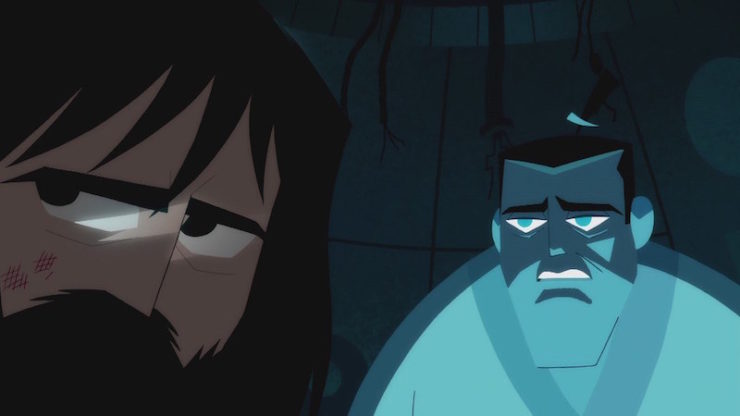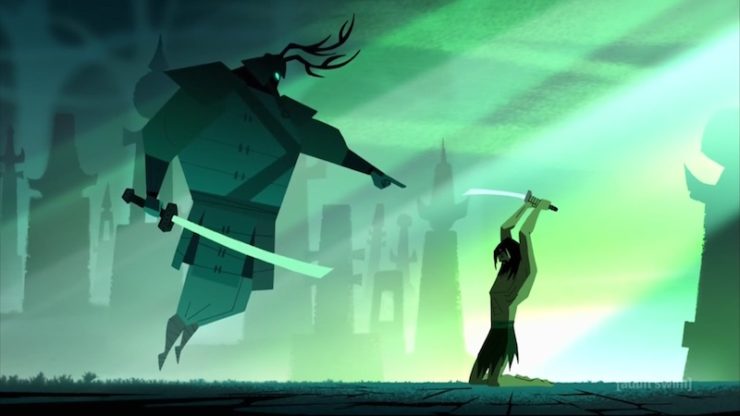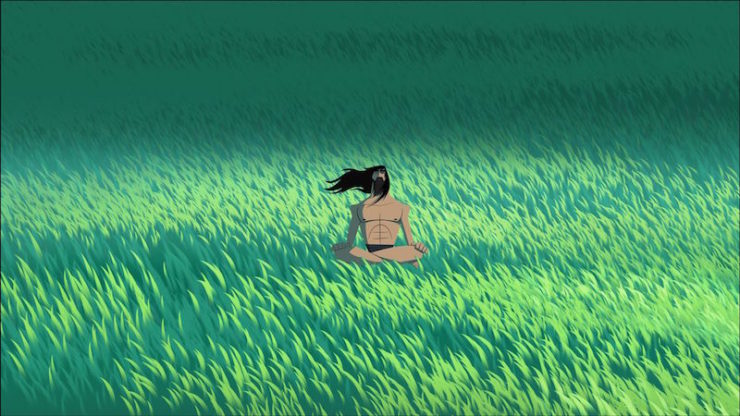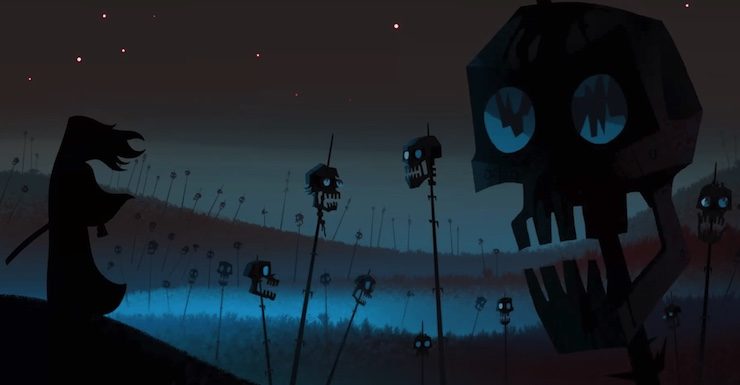Samurai Jack—Cartoon Network’s hit show in which a samurai prince from feudal-era Japan is transplanted to a dystopic future by his nemesis, the evil spirit Aku—created legions of fans during its original run in the early 2000s. Twelve years after it originally ended, the show has been thrilling its now-adult audience each week during its fifth and final season, which started in March and ended this past weekend. Because its core audience are no longer children, Samurai Jack’s creator Genndy Tartakovsky decided to give the show a much more mature tone in terms of its themes and overall approach. Sometimes, the shift can be jarring, such as when the show opts to make explicit penis or erection jokes; other times, the series’ more mature take on magical realism is remarkably haunting—as is the decision to devote half of its season to exploring Jack’s full-blown depression and PTSD.
Content Warning: Discussion of suicide and depression.
Spoilers for Season 5 of Samurai Jack.
Tartakovsky has advanced Samurai Jack’s original storyline by 50 years; however, Jack, who has been transplanted in time, doesn’t age. He’s almost a demi-god of sorts—traveling the countryside as an ageless being who is slowly losing his will to live…much less fight the good fight against Aku. When we first meet Jack in this new season, you can tell that his mind has degenerated in ways his body has not: he is constantly haunted by images of his family—overwhelmed by his guilt and feeling responsible for their deaths because of his inability to defeat Aku—as well as visions of the innocents in the present (future) timeline he couldn’t protect.
The most powerful scene from the first half of the season is Jack sitting by a fire, trying to let his mind rest. Instead, he is shocked out of his moment of precious calm by a hallucination of his father, the former Emperor, being tortured. His “father” yells angrily that Jack has forgotten his purpose. “You’ve forsaken us!” the Emperor screams, launching Jack into yet another episode of mental self-flagellation. It’s a poignant scene, driving home the sense that Jack can’t get a moment’s peace because of the constant torture he inflicts upon himself, mentally and emotionally; the instant he forgets to beat himself up, he immediately punishes himself for forgetting his crushing guilt.
Throughout this first episode and the several episodes that follow, a mysterious armored samurai spirit, The Omen, follows him—either as a warning or as an enticement to commit suicide. Suicide is mentioned in less subtle ways as well, throughout the season—multiple times, Jack is shown talking to a version of himself. His own conscience has manifested as a hallucinatory avatar. A very tired manifestation of himself begging him to commit suicide.

One of the key elements from the original run of Samurai Jack was the fact that Jack’s villains would almost always be robots sent by Aku. This allowed for Jack to kill his antagonists on screen without upsetting the censors, and it also helped Jack retain his heroic status for kids; Jack’s famous sword was only used against evil robots and demons, and the “blood” seen so often on the show was merely blue/black oil. But in this season, robots aren’t the only things squaring off against Jack—there are people are after him, too.
Jack’s depression continues to build throughout the first half of the season, particularly after he realizes that the Daughters of Aku, a team of new villains, aren’t robots, but real women. He kills one daughter in a fight, believing her to be a robot, and is horrified to see real blood welling up from her slashed throat. It’s at this moment that Jack’s paranoia, depression, and guilt are sent into overdrive. He wrestles with his actions, and with the fact that it seems like the only way to defeat the Daughters is to kill them (or be killed by them). He finally comes to terms with his resolution to kill the Daughters, but once he’s finished, his emotional turmoil continues and he imagines that he’s hearing the birds in the forest calling him a murderer. He yells back to them that the Daughters chose their path (which is debatable, since the audience knows their cult-leader mother brainwashed them into that path, training them as assassins from birth). His guilt leads him to (successfully) rehabilitating one of the Daughters—Ashi, who miraculously survived the slaughter. But this isn’t enough to assuage Jack’s conscience.
Jack’s mental state hits its lowest point in Episode XCVII, when he thinks he’s killed the kidnapped children that he and Ashi have been trying to save from Aku’s henchmen. The kids aren’t dead, but Jack’s fifty years’ worth of guilt has been ramped up to such a degree that the mysterious samurai spirit who has been following Jack throughout the season tells Jack “It’s time.” Clearly, we as the audience are meant to believe that we’re about to see Jack commit seppuku.

Thankfully, Jack doesn’t kill himself—he’s saved from the graveyard of the scheming samurai spirit and other warrior spirits by Ashi—but this moment marks the climax of the series’ sensitive and thought-provoking meditation on mental illness. In many ways throughout this season, the show, despite—and sometimes by way of—its many fantasy and sci-fi elements, offered its viewers realistic insight into how oppressive depression and guilt can be.
Tartakovsky has always planned for Jack’s journey to reach to this gutpunch level of emotional pain. “In my perception of the show the darkness was surface. It was dark because the show was sad, but it didn’t go down into the soul. Here we get to go all the way to the bottom,” he told Polygon in February. “The haunting of the past and the self, is a pressure that you either need to forget or grieve. He’s traumatized and he cannot let go.”
Jack’s suicidal tendencies also provide viewers a glimpse into how mental illness can make some believe the lie that the world is better off without them. While Jack believes himself to be worthless and allows himself to be lead to the graveyard of the warrior spirits, Ashi sets off to find him and discovers just how many people Jack has helped during his travels in the future. She learns how much good Jack has brought to the world, despite Aku’s stranglehold on its people, and this makes her even more determined to save Jack from himself.
As I said, Ashi saving Jack in his moment of crisis serves as distinct demarcation line in regards to the season’s focus on mental illness. The resolution of Jack’s mental issues isn’t handled as gracefully. There is only one episode devoted to Jack’s struggles in the wake of his near-suicide, and it feels like a rush job. Apparently, all Jack needs to do is meditate and tell his angry conscience to go fly a kite in order to return to his former self and finally retrieve his legendary sword (the sword destined to kill Aku). But of course, that’s not at all how the journey to mental health plays out in the real world—no one who’s suffered from mental illness has the option of simply meditating for a couple of hours, opening their eyes, and going about their business like nothing’s ever happened. Yes, this show is a fantasy—but for all the build-up we got detailing Jack’s battle with mental illness, it would have been nice to see the later half of the season pay just as much attention to the resolution, because there’s a lot Jack feels he needs to atone for, in his own mind.

As Eric Thurm from the A.V. Club wrote, “Of course it’s exciting to see classic Jack, and it’s thrilling to see him regain the sword, but this feels both like it was a long time coming and like it happened a little too quick. (It’s the closest this season has felt to being a kids’ show, which I don’t mean as a compliment.)” Joshua Yehl from IGN goes even further in his analysis of the problem, focusing on the fact that Jack vanquishes his angry conscience without reckoning with the fact that his anger is a part of him.
The real problem with the whole Mad Jack thing is that we never truly see it reflected in Jack himself. Yes, Mad Jack was constantly barking bitter words inside Jack’s mind, but did that ever really show on Jack? Sure, Jack was more somber and cranky than usual, but he still felt like good ol’ Jack most of the time, when it really counted. Had there been more real-world consequences to the presence of Mad Jack, then overcoming him would have been more gratifying to watch.
At the end of the day, though, Samurai Jack has used fantasy to explore, in a mature and compassionate way, the tough road of depression. It’s a road that can make you believe the worst in yourself. And despite the rushed ending the show is taking, there’s still value in seeing Jack succeed over his demons, and it hasn’t been lost on fans of the show. In a recent discussion on Reddit, one commenter noted, “Once again Jack pushes past all that, the emotional burdens and his own self doubts, and he finds the will to continue his quest to save those he loves. If Jack can find it in himself to face every [day’s] impossible challenges, then I can find it in myself to face my own challenges.”
Note: The National Suicide Prevention Lifeline and non-profit organizations such as To Write Love On Her Arms can provide valuable resources, support, and information for people hurting or in distress, struggling with addiction or mental illness, or anyone who simply needs to talk.
Monique Jones is an entertainment journalist, blogger, and founder of JUST ADD COLOR, a multicultural pop culture site. Jones has acted as a consultant for Magic: The Gathering and her writing has been featured on Ebony.com, Comic Book Resources, Entertainment Weekly’s Community Blog, The Miami New Times, and more.










